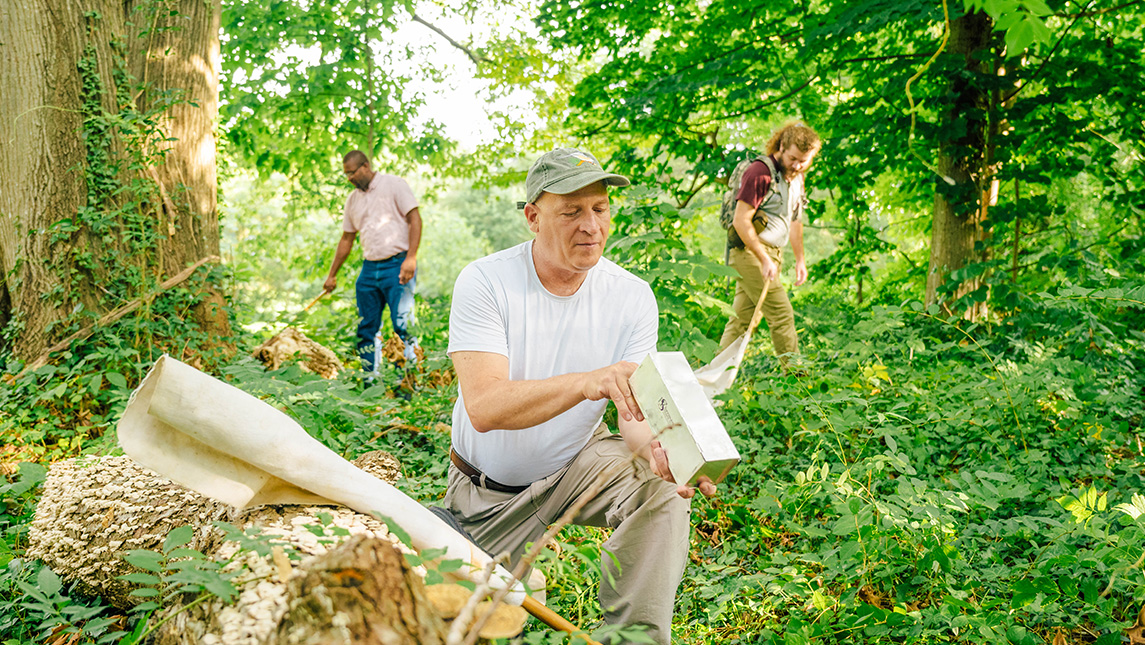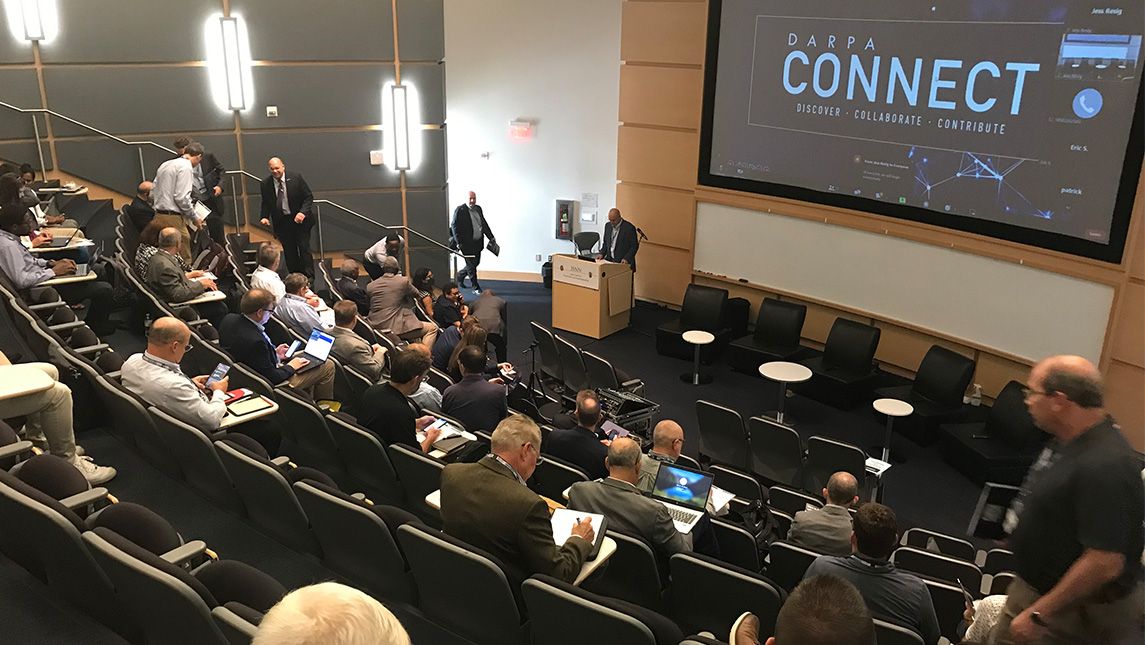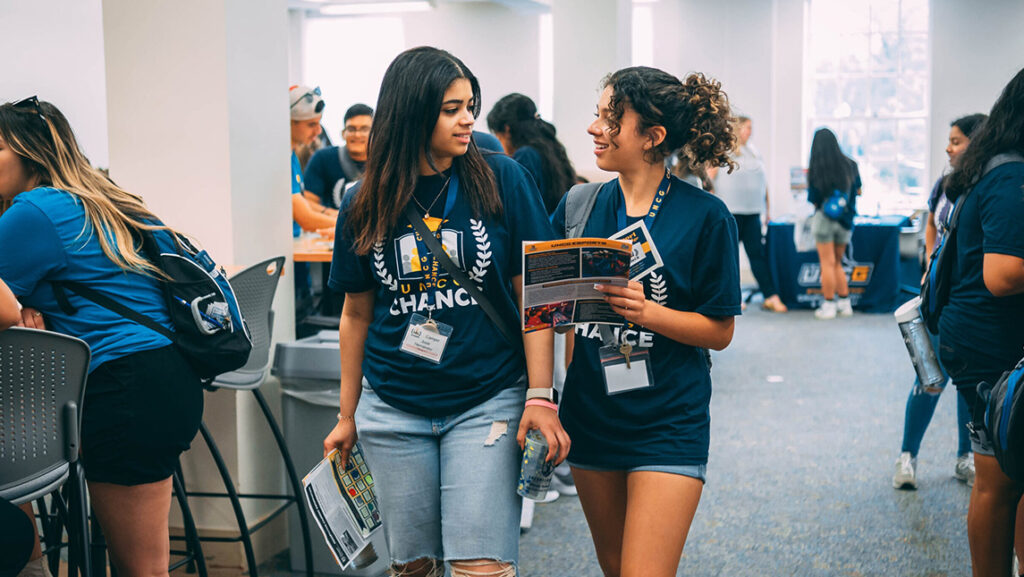Deep questions and discussions may start in the classroom or the lab, but a key part of advancing UNC Greensboro’s mission as a research institution is creating touchpoints with experts. Conferences are a powerful resource for everyone, whether they’re an undergraduate doing their first research project, a doctoral student who’s worked with multiple grants, or a longtime faculty member.
UNCG faculty and staff help organize conferences both on campus and outside North Carolina. Their hard work gives educators, students, business owners, researchers, and government representatives a platform for everything from military research to the economic impact of substance abuse.
Here are some of the conferences that left an impact at UNCG during the Fall 2023 semester.
Substantial solutions
Creating effective programs that prevent or treat drug and alcohol abuse combines the research interests of Dr. Jeremy Bray, Jefferson-Pilot Professor of Economics in the Bryan School of Business and Economics. “I’m a health economist, and what I focus on is health behaviors, with a heavy focus on the economic evaluation of substance use screening and brief intervention programs,” he explains.
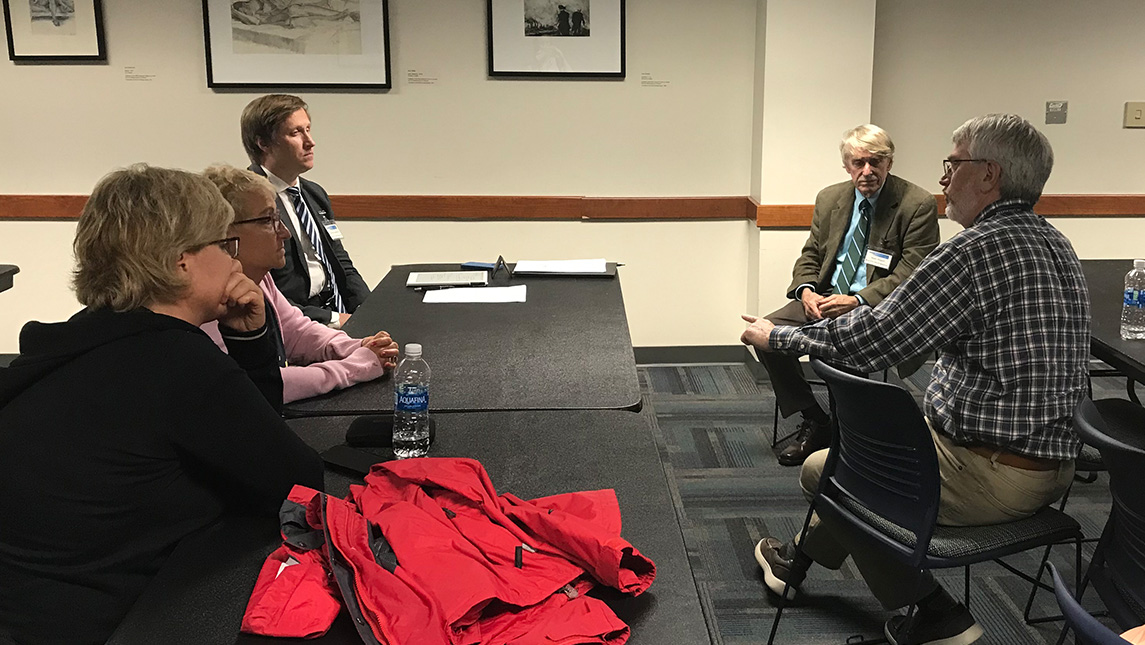
Bray is president of INEBRIA, an organization that works closely with the World Health Organization (WHO) on policies to address excessive alcohol use and substance abuse. He organized their annual conference at UNCG in September. Scholars from the United States, Europe, Africa, and Southeast Asia got to meet with key health advisors from WHO and the National Institute on Alcohol Abuse and Alcoholism.
Bray was not only the organizer but one of the presenters. He worked with researchers in the United Kingdom who ran a pilot test for connecting remand prisoners with treatment, with Bray looking specifically at the cost-effective analysis. At the conference, they were able to share their initial findings before they submit the research for publication.
INEBRIA was also a place for newer scholars such as Scarlett Ruppert ’18, a third-year doctoral student in UNCG’s Public Health Education Department with a focus on worksite health prevention. She presented the research she had done with Prevention Strategies, an affiliate of UNCG, on whether an analytical technique known as MOST (Multiphase Optimization Strategy) could benefit healthcare workers at risk of substance abuse.
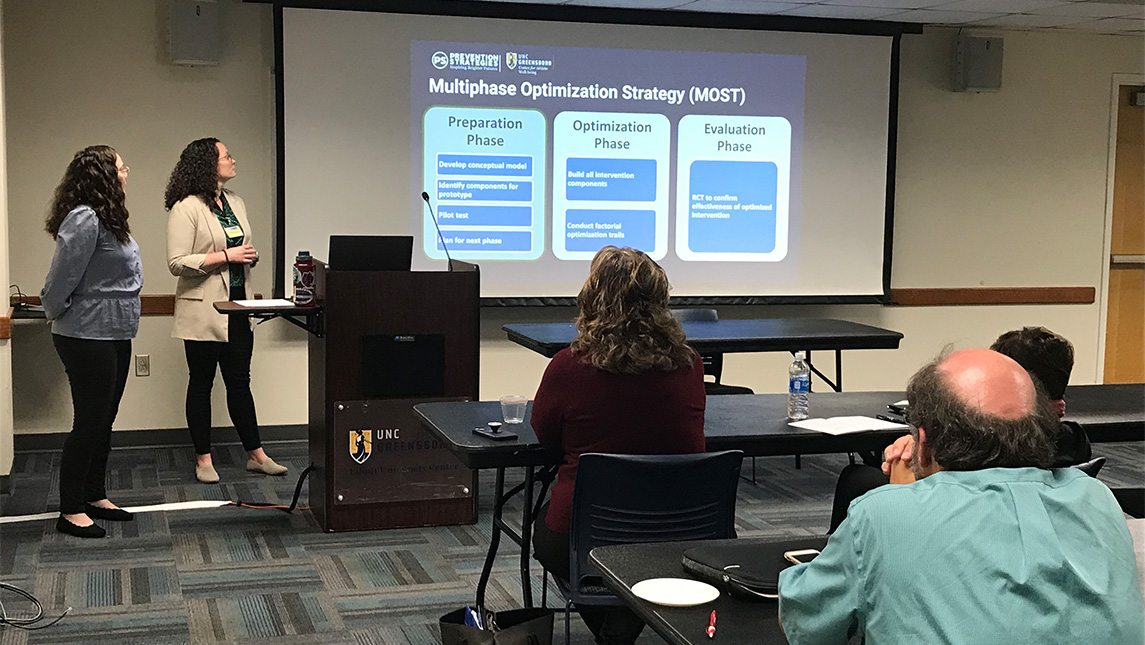
Ruppert found out about INEBRIA thanks to Bray, who is on her dissertation committee. “I haven’t done research specific to opioids and substance abuse,” says Ruppert, “But because I had an employee wellness focus, I still found a way to fit it into the conference.”
She also enjoyed the chance to network. “Jeremy is good friends with a lot of people who go to the conference every single year,” she says. “I got to mingle with them at dinner, and then on Friday after the conference, some stayed in town to get pizza and talk.”
“Smaller conferences like this are fantastic for students like Scarlett,” says Bray. “Large conferences can come to town, take over four or five hotels, every room, every conference room. There are thousands of attendees, and it’s hard to find someone. When you go to a small conference like INEBRIA, you can just walk up to people and start talking to them.”
Military pursuits
Conferences hosted by UNCG not only benefit students. For example, the Joint School of Nanoscience and Nanoengineering (JSNN) has a strong relationship with the U.S. military, as seen with its ICONS project. Thanks to hosting the DARPAConnect Regional Pop-Up in September, local business owners could also learn how to put their research and products toward national security.

The U.S. military looks to private sector partners to give service members top-of-the-line tools in fields such as virtual reality, medicine, and clean energy. However, the application process for a collaboration with the Defense Advanced Research Projects Agency (DARPA) is complicated.
DARPAConnect was created by the non-profit group Applied Research Institute (ARI) to help business owners form connections with DARPA project managers. “DARPA wants to be at the forefront of development, and to transition that downstream to the warriors of tomorrow, and enterprise,” said Bill Kiser, ARI executive vice president for science and technology.
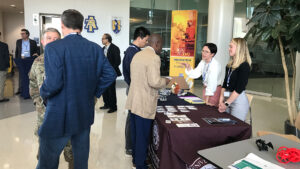
The JSNN campus was a perfect setting to discuss everything from terminology to timelines. While formal information sessions were held in its two-story auditorium, attendees could hold casual conversations over a cup of coffee in the spacious lobby.
“Having DARPA in the state of North Carolina is really timely. We have one of the largest military footprints in the nation,” Provost Debbie Storrs said in her opening remarks. “Military industries are among the largest employers in the state of North Carolina.”
Her thoughts were echoed by the keynote speaker, Ret. Maj. General Rodney O. Anderson, chair of North Carolina Military Affairs Commission, who stated that North Carolina is home to 120,000 uniformed service members. “We have the research network and the end-users of those technologies,” he said.
History Above and Below
Graduates of archaeology are going to be in high demand over the next ten years, says Dr. Geoffrey Hughes, a lecturer in UNCG’s Anthropology Department. It’s one reason he’s grateful for the 2023 Southeastern Conference on Historic Sites Archaeology (SECHSA), which he organized with Dr. Linda Stine, professor emerita of historical archaeology.
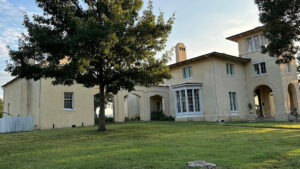
“We wanted it to be open and more relaxed,” says Hughes. “Students could strike up a conversation with a professional, ask if they had upcoming projects or internships.”
Hughes and Stine secured an iconic building in Greensboro to host the 2023 Southeastern Conference on Historic Sites Archaeology (SECHSA) in August. The Blandwood Mansion is famous for being the former residence of North Carolina Governor Morehead. Stine has done several excavations there. “It serves to remind people that archaeologists aren’t just concerned with what’s beneath the surface of the ground,” says Hughes. “We also look at features, buildings, and sites that are visible above the surface.”
SECHSA appeals to students and professors engaged not only in archaeology, but also history, preservationist efforts, architecture, heritage management, and historic landscapes. SECHSA’s attendees work in higher education, for state agencies, and the private sector.
They heard presentations about African American cemeteries and the shipwreck of the Queen Anne’s Revenge. Hughes’ presentation looked at the connections between religion and business in the Moravian town of Old Salem. Stine incorporated Blandwood Mansion into her presentation on material culture and the creation and collision of diverse individuals and communities in the South.
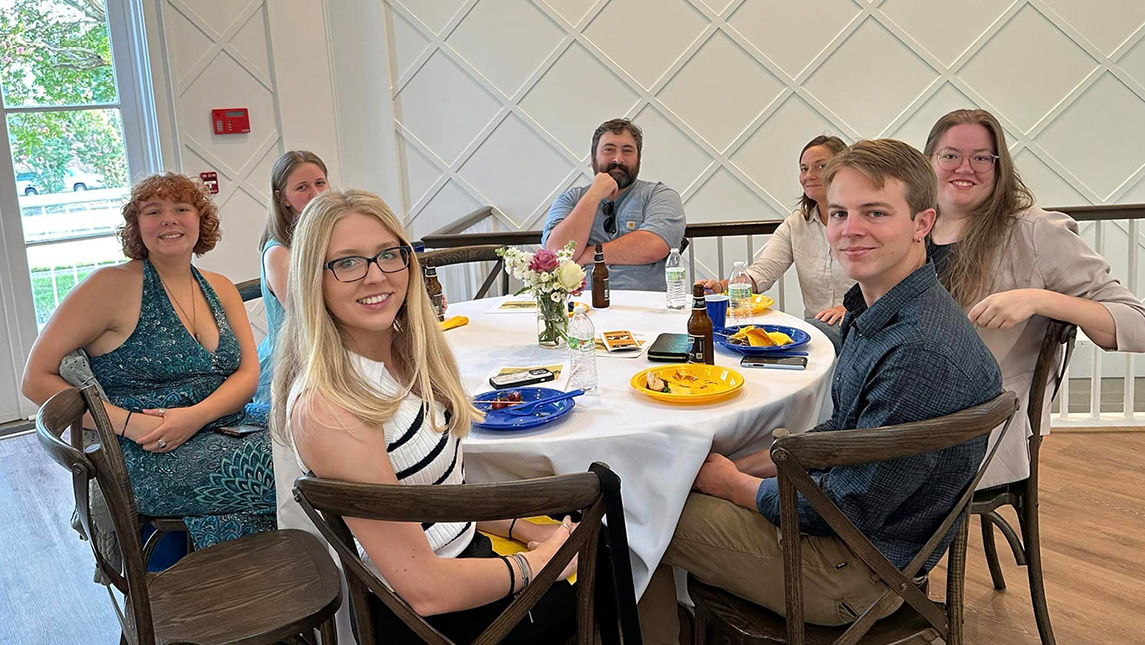
The conference is organized so that presentations don’t overlap. “Attendees don’t have to choose between two or three different sessions that are competing against each other,” explains Hughes. “This tends to facilitate conversation and more interaction between scholars and students.”
While students can ask about work and research opportunities, Hughes says they also get to know the people who share their interests. “It helps to demystify the distance between being a student and being a professional archaeologist. They see that archaeologists are real people. They’re approachable, and for the most part, archaeologists are very outgoing and friendly.”
Closing the Divide
Dr. Jenni Simon has done a lot to promote research that improves communication across communities, as director of undergraduate studies in UNCG’s Communication Studies Department (CST), as former editor of the journal for the Carolinas Communication Association (CCA), and now as the association’s president. Communication studies faculty from across North and South Carolina came to UNCG for the group’s annual conference in September. Its theme this year was “Communicating Across Differences.”
“Race, religion, and socio-economic status are prominent when we talk about difference,” says Simon. “But other ways that we wanted to look at difference was ability and disability. What makes learning ‘different’ or ‘divergent.’ How can they speak and advocate for themselves?”
The theme was a fresh opportunity to share one of the projects that UNCG CST has done with the Greensboro community, called Democracy Tables. The initiative, which began in 2020, facilitates conversations to deepen civic engagement and encourage respectful discussions even when the topic is contentious.
“Often, you have people positioned on both sides of the issues, but they’re not talking about what they want. They’re talking at each other, past each other, or yelling at each other,” says CST Department Head Christoper Poulos, who led small group discussions with help from other CST faculty and staff. He’ll be using the model in a class this spring called Listening and Dialogue. “Part of my goal is to teach that set of listening skills, and of talking in ways that are much more about inquiry rather than advocacy.”
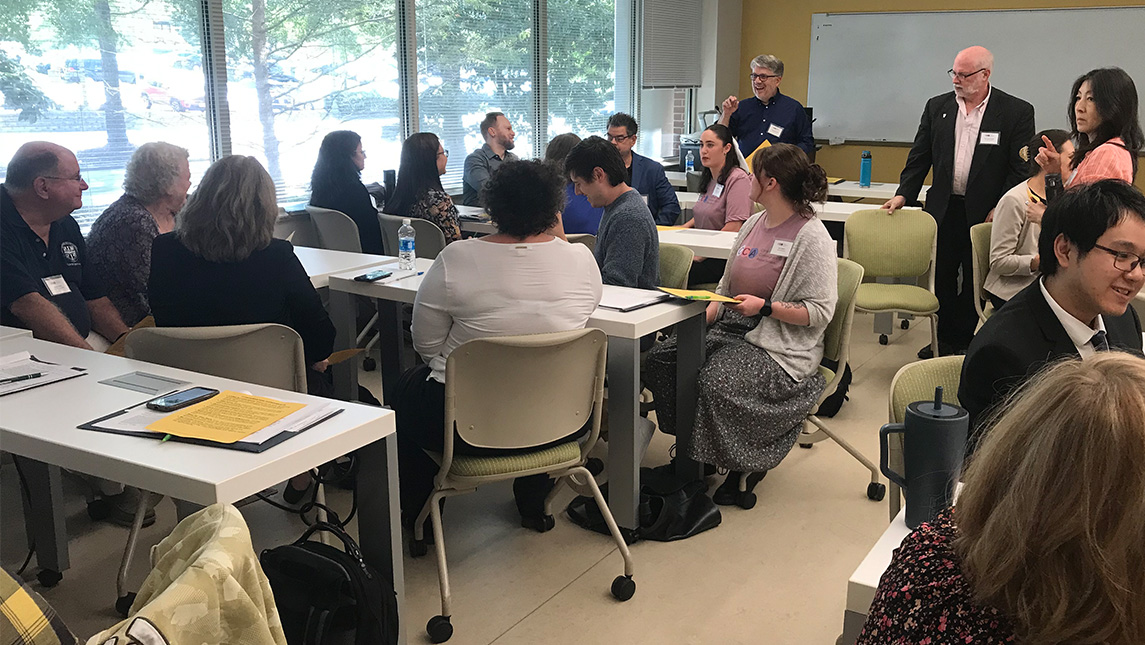
Poulos would like to see the Democracy Tables model spread to other communities, so he was grateful to share it with scholars outside UNCG. “There’s something about not being stuck in your department at a single university, seeing and hearing the same faces and perspectives day after day,” he says.
Simon, like other faculty members participating in conferences, also appreciates the chance to listen to peers’ feedback on one another’s scholarship. “As faculty, we have to produce original research,” she says. “At conferences, we can share our research. We can say, ‘Have you thought about doing this?’ Or, ‘This is the beginning of my study, and here’s what I found.'”
Inspiration goes beyond what they ultimately publish in a journal. “You also get ideas on how to run activities in the classroom,” says Simon. “From a philosophical perspective, it’s a way to learn and serve the love of learning.”
That love of learning will find its way to students, whether they attend the conference themselves or come to class with a faculty member who’s just refueled their passion for academics.
Story by Janet Imrick, University Communications
Photography by Janet Imrick, University Communications; and Natalie Adams Pope, New South Associates, Inc.
